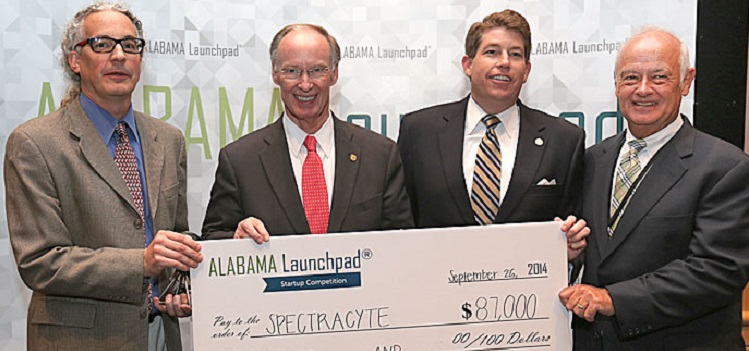USA Research Team Awarded $87,000 in Statewide Competition
Posted on September 26, 2014

A University of South Alabama research team was awarded $87,000 today by the Economic Development Partnership of Alabama for research into creating advanced endoscopic imaging technology for cancer detection.
SpectraCyte, co-founded by Dr. Silas Leavesley, associate professor of chemical and biomolecular engineering, and Dr. Thomas Rich, associate professor of pharmacology, was one of five companies from across the state to be presented grants at the 4th Annual Alabama Launchpad Innovation & Entrepreneurship Conference in Birmingham.
The USA team received the second highest award. Together, about $250,000 was awarded by a five-judge panel to the competing groups.
“This research has the potential to revolutionize the medical imaging industry,” said Lynne Chronister, USA vice president for research and economic development. “Two South Alabama professors from different disciplines joined forces, and the result is a promising technology that will attract interest from physicians and scientists from across the country.”
The goal of SpectraCyte is to produce next-generation endoscopes for colorectal cancer
screening as well as advanced research tools for biomedical microscopy. SpectraCyte
technology is founded on a patent-pending process for high-speed hyperspectral imaging
– acquiring image data over a series of wavelengths. This technology allows molecular
properties of a tissue, such as a tumor, to be identified based on their spectral
fingerprint. Use of hyperspectral imaging for endoscopy should result in a much higher
sensitivity and specificity for identifying colorectal cancers and pre-cancerous lesions.
Leavesley and Rich have developed a prototype of the high-speed hyperspectral imaging
module. Alabama Launchpad support, Leavesley said, will fill an important funding
gap, commonly known as the “Valley of Death” for translational technologies.
“The Alabama Launchpad funding will help us develop the technology from the current prototype to a compact and portable version for data collection,” Leavesley said. “It puts us another step closer to commercialization.”
The USA project was one of six announced earlier this year for grants awarded to University faculty through USA’s Abraham A. Mitchell Cancer Research Fund.
The Alabama Launchpad competition is geared to promote and reward high-growth, innovative ventures that have the potential to create and retain jobs in Alabama. It is financed by businesses, the state of Alabama and seven universities, including USA. Since its inception in 2006, more than 30 companies have been funded with more than $1.3 million.



